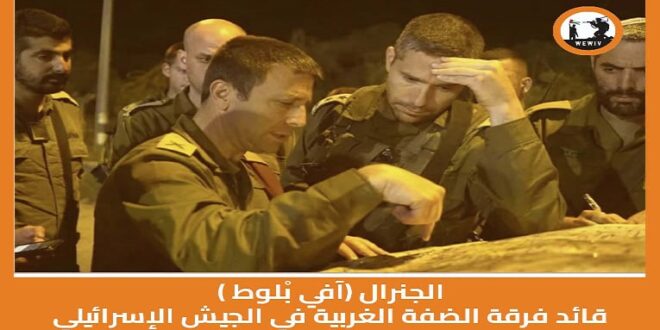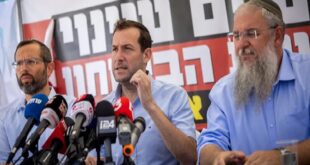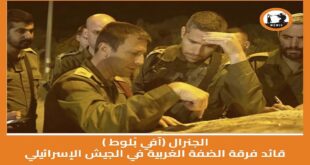By: Madeeha Al-A’raj
The National Bureau for Defending the Land and Resisting Settlements stated in its latest weekly report , that the head of the Military Intelligence Division, Aharon Halifa in the Occupation Army – ‘Aman’ decided last April 27 to resign from his post after his failure to prevent the Oct. 7’s attack, where he confirmed in his resignation letter that he bears responsibility for failing to prevent the unprecedented attack on Israel. Political and media analysts in Israel believe that his resignation was a sign to the Chief of Staff of the occupation army, Herzi Halevy, the senior officers and generals in the military establishment, and the head of the General Security Agency – ‘Shin Bet’, Ronen Bar, to take responsibility and follow his footsteps in the snowball that has begun to roll in the Israeli military and security establishment, which opened the door wide in the battle for new appointments in this institution and placed it facing challenges in everything related to the identity of the generals,are going to succeed them.
At the end of the week, the Chief of Staff of the occupation army, Halevy, decided in agreement with the Minister of the Army, Yoav Gallant, and to appoint AviBallut, Netanyahu’s former military secretary, as commander of the Central Command in West Bank, and Shlomi Binder as head of the Israeli Military Intelligence Division, “Aman,” to succeed Aharon. Haliva. This came within the framework of a settlement that didn’t fully take into account the wishes of the PM of the occupation government, who was planning to appoint those close to religious Zionism and settler leaders to these positions, specifically, as many rumors have circulated about the role of Netanyahu in nominations for new promotions, even though they are not his powers, but rather those of the Chief of Staff and the Minister of Army.
Sources close to Netanyahu leaked that he was considering the nomination of officers loyal to religious Zionism and settler leaders for such positions, including the position of military commander of the West Bank. For the position, Netanyahu’s preference was for Ofer Venter, who incited his soldiers to kill the Gazans in the 2014’s aggression, and was known for his extremist religious speech in front of his soldiers at the time when he addressed the Lord, “We are going to fight for your people Israel against an enemy that hates your name.”
He also preferred General EliezerTolidan to head AMAN, as he is very close to Netanyahu and one of those who promoted the idea that “Hamas is a deterrent and concerned with improving the economic situation in the Gaza Strip,” in his capacity as the former commander of the Southern Command in the army, and before that as commander of the Gaza Military Division and as Netanyahu’s military secretary. Netanyahu knows well that these people belong to the extreme right-wing religious Zionism Movement and are close to the leaders of the settlers in the West Bank, Which means strong support for the settlers and at the same time entails doubling the suffering of Palestinian citizens.
What concerns us in this report is not the hidden conflicts between the political and military institutions in the occupying state over the formation of the army staff after the major failure on the seventh of last October, nor the differences between the two institutions’ candidates for sensitive positions in the leadership of the occupying army. Everyone realizes that the differences are not so fundamental as they are in form, not in cotext. If Netanyahu’s candidate for both the leadership of the Central Region and the “Aman” clearly belongs to religious Zionism, then their alternatives, who were chosen by Galant and Halevy, are not far from that. Hence, the question arises about the personality of the new commander of the central region ‘West Bank’ and expectations regarding the behavior of the occupation army and its relationship with settler leaders and introspection activities in the foreseeable future.
The new military commander for the central region is General AviBallut, after the appointments were issued, he does not officially belong to religious Zionism, but in his belief he is a son of neo-Zionism with his extreme right-wing tendencies. He is a settler, as are Itamar Ben Gvir, BezalelSmotrich, and many other Israeli politicians and military personnel. His predecessor in the position, Yehuda Fuchs, the settlers used to say: “He is from us and we are from him.” Is this what will be the case with AviBallut, regardless of the screaming of Ben Gvir and Smotrich about the new appointments to the Chiefs of Staff of the occupation army.
General AviBallout is a settler in the occupied West Bank. He worked as the commander of the West Bank Division in the occupation army. He encourages the seizure of lands to establish settlements and random settlement outposts. He wears the “kippah” ‘hood of religious Jews’ and is considered close to the settler leaders. He was appointed to the position of commander of the central region to provide essential support to the settlers and their settlement activities.In 2019, AviBallut distributed a book to the brigade commanders in the division during a meeting centered around the elements of a sense of security in the settlements.
The author of the book, which bears the title “Ours in the Tabu: Secrets of the Saviors of the Lands” from our father Abraham until the youth settlement.” He is LiorZeberg, who works in buying lands in the West Bank by fraud or otherwise. He is a well-known person in the settlements, and he defines himself as providing “consultation to entrepreneurs, associations, and local authorities, as well as to heirs who have found old ownership documents”, and the term “clearance “Lands” in Zionist language means seizing Palestinian lands.
It is known that “youth settlement” is a name given by settlers to the random settlement outposts that were initially established on private Palestinian-owned lands, without an official government decision, and they began to expand until they spread throughout the West Bank. Ballout wrote a dedication to the officers on the book, in which he believed it would help them understand the issue of the status of lands in the West Bank. The army spokesman claimed at the time that the book was distributed “for the purpose of studying the subject only” and that its distribution did not constitute an expression of a position on the subject. Ballout wrote in the dedication to the book:
‘Dear leaders, in order to carry out the defense mission in Judea and Samaria i.e. the West Bank, there is a need to establish many cooperation procedures and to be professionals and possess information in many fields in addition to the military profession. The field of settlement and the status of the lands is one of the fields, which requires knowledge in order to make the tasks integrated and I hope that the book helps in understanding the topic and recognizing the different elements associated with it.’
As for the subject of the army and settlers, the Israeli Army Minister, YoavGalant, signed last week 5 administrative detention orders against settlers who carried out terrorist acts in the towns of Duma and Al-Mughayir in the West Bank two weeks ago. According to Israeli reports, the five settlers were the organizers of the bloody attacks on Palestinian villages, in which a number of Palestinians were martyred and injured by settler bullets, and dozens of Palestinian homes and property were burned. According to Israeli sources, it became clear that the settlers had previously been subject to administrative restrictive orders, and to previous investigations by the Shin Bet General Security Service, and had been warned not to repeat their terrorist acts. Despite that, they had recently carried out terrorist acts in Palestinian villages. Commenting on the decision of the Minister of Defense, the extremist Minister of National Security, Itamar Ben Gvir, said, “Gallant’s prosecution of the settlers is exactly like the international court’s anti-Semitic prosecution of the government of Israel.” He claimed that the Palestinians are the ones who practice terrorism against the settlers, and that Minister Allant turns the victim into an accused.
Within the context, the occupation army had reduced its forces guarding the settlements in the West Bank, which it calls “regional protection,” so the number of soldiers gradually declined from 8,000 at the beginning of the war on Gaza to about a thousand, according to Haaretz Newspaper. The reduction in the number of these forces came as a result of an assessment of the situation conducted by the Israeli army after the end of the month of Ramadan and the Jewish Passover, and as a result of understandings between the army and the heads of the settlements, which included continuing to defend the settlements. The occupation army considers that the security of the settlements has greatly improved since the outbreak of the war, after the establishment of more military sites and as a result of intensive and continuous patrols by Israeli forces.
According to the plan drawn up by the army and the settlers, the army will keep a number of soldiers in reserve in each settlement, increase the number of armed settlers, and strengthen the armed militias in the settlements, which they call “ready teams.” At the beginning of the war on Gaza, the occupation army had summoned 8,000 soldiers in the armed forces. Reserves for the Regional Protection Brigades. 5,500 of these are settlers involved in terrorist attacks on Palestinians and their property. Haaretz adds that in at least one case, a settler who confessed in the past as part of a deal with the Public Prosecution to attacking a Palestinian citizen and an Israeli left-wing activist was recruited and armed, In another case, a military weapon was provided to a settler, who also confessed, through a deal with the prosecution, to attacking and robbing Palestinians.
On the other hand, Judaization efforts continue in Jerusalem and other areas of the West Bank in clear exploitation of the brutal conditions of war waged by the occupying state on the Gaza Strip, as well as in the West Bank. Four Israeli human rights organizations, including IrAmim, the Association for Civil Rights in Israel, the HaMoked Center for the Protection of the Individual, and EmekShaveh confirmed in a joint report that during the war on Gaza, the Israeli authorities continue to work to strengthen the Jewish presence in East Jerusalem by creating tourist centers of interest. Oriented to the biblical Jewish history of the city, it restricts the Palestinian life space and excludes the population, both materially and historically outside the Old City, and placing obstacles to any future settlement.
Diligently in the field of archaeological and heritage sites in East Jerusalem for the purpose of extending control over the lands and changing the narratives, as the Nature and Parks Authority and the “Elad” settlement association continue to promote the Judaization of Wadi Al-Rababa and seize large areas of land planted with olive trees and erect gates and barriers at the entrances to lands owned by Palestinians, which prevents residents from entering their lands, in addition to the bridge and large archaeological excavations in the Silwan Neighborhood in search of the “Pool of Silwan” after the “Elad” Association seized a land that was owned by the Orthodox-Greek Church near the archaeological site and the sky-train project connecting to the so-called ‘City of David’ after the publication of confiscation orders for lands with an area of 8,752M2 in favor of finding an area to erect columns.
Settlers also continue to storm archaeological areas in MasaferYatta, pursue shepherds, and control wells and pastoral lands in preparation for seizing more citizens’ lands. Last week, dozens of settlers stormed the archaeological hill of Ma’in in MasaferYatta, south of Hebron, while Jewish terrorist organizations prevented Palestinians from grazing their livestock in the northern Jordan Valley. In Tal Na’in, dozens of settlers stormed the archaeological site, erected flags, and performed their Talmudic rituals to protect the occupation forces, in preparation for seizing more citizens’ lands.
In Khirbet Al Farisiya in the northern Jordan Valley, settlers prevented livestock herders from grazing their livestock on pastures and the remains of rain-fed crops after harvesting them, as livestock breeders usually benefit on such days from the remains of rain-fed crops that are harvested at this time of the year or irrigated crops after the completion of picking them.
Regarding the sanctions that the American Administration was waving against the “Nitzah Battalion” and other military and police units with a dark terrorist history in dealing with Palestinians under occupation in the West Bank, it became clear the extent of Zionist influence in decision-making centers in the United States of America. The US State Department backed down from imposing sanctions on military units in the occupation army, which occupied the media for a period of time and mobilized the leaders of the occupying state, both in government and in the opposition, to discourage the US Administration from such a step.
In justification of this decline, the US State Department said that an examination conducted by Washington concluded that 5 military units in the Israeli army were responsible for serious human rights violations, and said that all the incidents it examined occurred before the attack of last Oct. 7, and that none of them occur in the Gaza Strip. The US State Department claimed that 4 of the units dealt with these violations effectively,” adding that “Israel provided more information about a fifth unit and that it is continuing dialogue with the Israeli government in this regard, in light of reports of the White House’s retreat from imposing sanctions on the battalion Netzah Yehuda of the occupation army.
List of Israeli Assaults over the Last Week Documented by the National Bureau:
Jerusalem:
- Demolishing a 3-story house belonging to the family of Ali Qasim Al-Khatib in the Hizmatown under the pretext of building without a license, and two barracks in the same area belonging to the family of Yousef Mahmoud Malihat.
- Fining Jerusalemie, Al-Maqdisi Abdullah Ghanem from the WadiHilweh neighborhood in Silwan, to NIS 700,000 for parking his son’s vehicle in a land that the settlement associations claim is a Jewish cemetery.
Hebron:
- Assaulting the young man, Omar Musa Muhammad, 20, while he was herding sheep in the WadiMa’in area of MasaferYatta, he sustained bruises. Others were also assaulted in the Khallet al-Dabaa area of MusaferYatta, and forced them to leave the area.
- Severely beaten a citizen under the protection of the occupation forces, which led to him sustaining bruises and wounds.
- Demolishing a two-story building house, 200m2, belonging to HamzaAyeshZein, who lives there with his family consisting of several individuals in Khallet al-Farn in the village of Birin.
- Destroying a water well and crops, fruit trees, cement fences, and barbed wire around an area of approximately one and a half dunams. It was notified of the demolition and the cessation of work and construction on three houses and a water well belonging to Azhar Al-Atrash, Sae’ed Abu Hadid, and another for the Abu Sneina family, in addition to a water well for the citizen Ala’ Al-Amour.
Bethlehem:
- Attacking farmers from the Salem Ali Hussein Eid family from the village of Jourat Al-Shamaa while they were working on their 30-dunum land, and prevented them from working on it, while citizens thwarted an attempt by settlers to seize a water tank belonging to the citizen Moh’dAbayat in Kisan, east of Bethlehem. As well as agricultural equipment and tents for Ibrahim Sawarka, where he confronted the settlers and prevented seizing them.
- Storming Ain al-Hawiya area in the western region of the village of Husan, and performed Talmudic rituals, while others seized quantities of the wheat crop after harvesting it in the lands of Wadi al-Abyad in the wilderness, the quantity is estimated at 2 tons.
- Attacking farmers in the Nahalintown, under the protection of the occupation forces, farmers in the Baniyas area, northeast of the town, which led to the outbreak of confrontations that included the firing of bullets, tear gas bombs, and sound bombs. Noting that settlers at gunpoint detained farmers, including children, in the Baniyas area, while they were plowing their land, which sparked a state of panic and fear among them.
- On Wadi-eNar road, settlers grazed their sheep on citizens’ lands in the town of Al-Khader, which were planted with vines and almond trees, causing damage to a number of them.
Ramallah:
- Attacking agricultural lands near the village of Al-Mughayir and fired live bullets at a number of citizens from the village who tried to confront them to protect their crops, especially olive trees. A few days ago, settlers erected two tents in an area called Ain Al-Banat, located between the villages of KafrMalekand Al-Mughayir, and there are fears that they will turn the area into a settlement.
- Seizing two bulldozers belonging to the citizen SaedHamed while they were working in a stone quarry on his land in the Silwadtown.
- Attacking citizens’ vehicles near the “Beit El” settlement, led to the smashing of the windows of a number of them, and caused material damage to them.
Nablus:
- Seizing a truck in the Qablan town, south of Nablus, while transporting building materials for a shop under the pretext of working in areas C.
Salfeet:
- Storming a house belonging to Khaled Abu Khair in the town of Deir Ballot, west of Salfeet, and caused material damage to 2 bulldozers he owned. Abu Khair told Salfeet Governorate’s media that the occupation soldiers raided the house and its yard and cut the electricity wires and cables of his 2 bulldozers.
Jenin:
- Bulldozing infrastructure, agricultural crops, electricity poles, and parts of the main street, 60 meters long and 10 meters wide, in the village of Jalboun, and turned a house located near the Basic Girls’ School into a military point. They also bulldozed agricultural lands in the village of Faqoua from the eastern side, adjacent to the Separation Wall, and opened a road all the way to the main street in the village.
Jordan Valley:
- Storming the tents of FathiDaraghmeh, a resident of Ain al-Hilweh in the northern Jordan Valley, and stormed the Arab Mleihat community, northwest of the city of Jericho, searching for livestock stolen from them. Destroying tents in Khirbet al-Sakot in the northern Jordan Valley belonging to the citizen Moh’d Abu Mutawa, while others prevented livestock herders in Khirbet Al-Farsiyya in the northern Jordan Valley from grazing their livestock on pastures and the remains of rain-fed crops after being harvested.
 المكتب الوطني للدفاع عن الارض ومقاومة الاستيطان منظمة التحرير الفلسطينية
المكتب الوطني للدفاع عن الارض ومقاومة الاستيطان منظمة التحرير الفلسطينية




